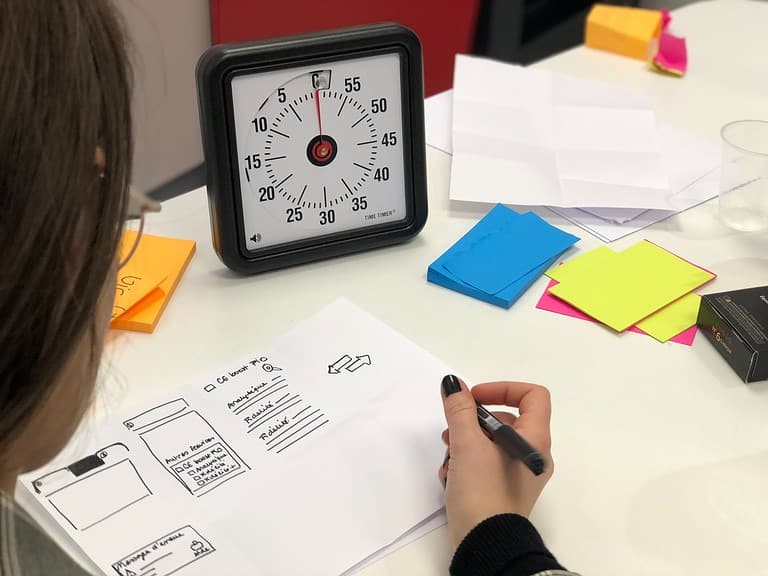Deep Work vs Shallow Work: Why You Should Prioritize Deep Work to Maximize Productivity
As an entrepreneur or high performer, your time is valuable – there are never enough hours in the day to get everything done.
We’re all familiar with the endless grind of shallow work—responding to emails, catching up on social media, and putting out fires. But how much of that busy work is truly moving the needle for your business?
What if I told you there was a way to shift your mindset and workflow to focus on your most important tasks?
Deep work is the key to maximizing productivity and making the biggest impact with your limited time each day. By focusing intensely without distractions, you can solve harder problems, learn more, and deliver higher-quality work.
In this post, I’ll discuss what separates deep work from shallow work, strategies for getting into a deep work “flow” state, and tips for protecting your deep work time so you can ditch the spin cycle of shallow tasks and start achieving breakthrough results.
What is the Difference between Deep and Shallow Work?
What is Deep Work?
Deep work isn’t just about working hard. In the book Deep Work, Cal Newport explains that it’s about diving into tasks that challenge your brainpower. Think of it as the ultimate mental workout. When you’re in the zone of deep work, you’re not just checking things off a list—you’re laser-focused, digging into complex problems, and producing your best work.
Examples of Deep Work Tasks
- Writing a research paper or article
- Developing a complex software program
- Analyzing data to derive actionable insights
- Crafting strategies for business growth
- Learning a new technology or skill deeply
By engaging in deep work, you immerse yourself in activities that challenge your intellectual abilities and, as a result, drive meaningful progress in your personal and professional life. Focusing on intensive tasks can significantly enhance your ability to produce high-quality work that stands out in any field, especially in demanding industries.
What is Shallow Work?
Shallow work consists of tasks that require minimal cognitive effort. These are the kinds of activities you can perform while multitasking or when you’re somewhat distracted. Although less demanding, shallow work is a necessary part of most professional landscapes, often helping to clear the way for more focused efforts.
Examples of Shallow Work Tasks
- Responding to routine emails
- Filling out forms or completing basic administrative duties
- Participating in non-critical meetings where your active input is minimal
- Routine social media updates and other forms of basic digital communication
- Organizing or tidying your workspace
While these tasks are essential for maintaining the smooth operation of your daily duties, they do not significantly enhance your skill set or lead to substantial achievements. Recognizing the distinction between when to engage in deep versus shallow work allows you to allocate your time and energy more effectively, ensuring that you focus on what truly drives value and personal growth in your career.
What is the Impact on Productivity and Quality?
The distinction between deep and shallow work significantly affects your productivity and the quality of your outcomes.
- Comparing Output: Deep work produces high-quality results that propel advancements in your career or studies, while shallow work often results in less notable outputs but maintains essential operations.
- Long-term Skill Development: Engaging in deep work fosters skill mastery and professional growth, unlike shallow work, which doesn’t significantly enhance your capabilities.
- Balancing Work Types: It’s crucial to balance both types of work for optimal productivity. Managing this balance ensures you handle day-to-day tasks while allocating enough time for high-concentration work that drives significant achievements.
Why Should You Prioritize Deep Work?
Prioritizing deep work transforms how you approach tasks, fostering a richer, more productive work environment. When you focus deeply, you’re not just completing tasks but enhancing your ability to work smarter. This approach allows for more profound insights and innovative solutions, giving you a competitive edge in any field.
Supercharge Your Creativity and Critical Thinking
Deep work sharpens your problem-solving skills by immersing you in complex scenarios that require serious thought and strategic planning. This focused effort leads to more effective solutions that can significantly impact your projects and goals.
Engaging in deep work removes surface-level distractions, allowing your creativity to flourish. This environment is conducive to generating innovative ideas, as you have the mental space to explore possibilities and experiment with new concepts.
Deep work also enhances your critical thinking capabilities. By dedicating blocks of time to intense focus, you train your mind to evaluate information more critically and make more informed decisions, essential skills in today’s information-saturated world. This kind of mental discipline is invaluable, helping you navigate complex challenges more effectively.
Allows You to Product High-Quality Work
Deep work facilitates the achievement of a flow state, where you’re completely absorbed in your tasks, and your productivity levels soar. This state allows you to perform at your peak and produce your best work, free from the interruptions that shallow work often entails.
The intense focus on deep work results in outputs that are not only thorough but also of superior quality. These high-value results can significantly impact your projects, enhancing both their substance and the satisfaction you derive from your work.
Regularly engaging in deep work can accelerate your career advancement. The skills you develop and the outputs you create set you apart as a high performer capable of handling complex challenges. This reputation for excellence can open up new opportunities and lead to greater professional growth.
Personal Growth and Satisfaction
When you focus intensely on your most challenging tasks and see them through to completion, the sense of accomplishment is unmatched. Deep work allows you to tackle complex projects that can lead to significant breakthroughs, giving you a profound sense of pride and achievement in your capabilities.
Engaging in deep work can also improve your mental well-being. This focused work style helps reduce stress caused by multitasking and constant interruptions, leading to a more satisfying and less fragmented workday. As you spend more time in a state of deep concentration, you’ll likely find your days more rewarding and mentally engaging.
Committing to deep work requires and fosters a high level of self-discipline. As you regularly carve out time for intense focus, you strengthen your ability to concentrate and resist distractions. This discipline extends beyond your work life, enhancing your ability to manage personal projects and commitments with the same level of dedication.
What are the Challenges of Deep Work in a Distracted World?
Let’s face it—the modern workplace isn’t exactly designed for deep work. We’re bombarded with notifications, emails, and the constant expectation of being “always on.” It’s like trying to concentrate in a room full of toddlers armed with pots and pans. But don’t worry; you’re not alone. Millions of professionals struggle with these distractions every day. The good news is that there are strategies to overcome these obstacles and reclaim your focus.
Common Obstacles to Deep Work
- Notification Overload: The constant ding of emails, Slack messages, and social media alerts can derail your train of thought faster than you can say “unsubscribe.”
- Collaboration Conundrum: While collaboration tools like Slack and Teams are essential, they can also turn into distraction magnets.
- Meeting Mayhem: Let’s be honest – not all meetings are productive. Often, they’re just interruptions disguised as teamwork.
- The Temptation of Multitasking: We might think we’re great at juggling multiple tasks, but research shows that it actually hinders productivity and reduces the quality of our work.
Multitasking: The Cost of Context Switching
In an attempt to juggle multiple tasks simultaneously, you may find yourself constantly switching contexts. This habit, known as multitasking, can severely undermine your ability to perform deep work and produce your best results.
Every time you shift from one task to another, there’s a cognitive cost. Your brain requires time to adjust to the new context, which drains energy and reduces overall productivity. This fragmented approach prevents you from achieving the deep focus necessary for complex problem-solving and creative thinking.
Chronic multitasking can lead to mental fatigue and burnout. The continuous strain of bouncing between tasks without sufficient recovery time taxes your mental reserves, leaving you feeling drained and unable to perform at your best.
The habit of multitasking forces your mind to crave constant stimulation, making it increasingly difficult to focus on a single task for extended periods. This can create a cycle where deep work becomes more challenging, and reliance on shallow, less demanding tasks grows. To counteract this, it’s crucial to cultivate habits that reinforce sustained attention and minimize context switching, allowing you to engage more fully in deep work and reap its rewards.
Overcome the Shallow Work Trap
Busy work often feels satisfying because it’s easy to complete and offers quick, albeit superficial, rewards. Recognizing this allure is the first step in reevaluating how you allocate your time. Ask yourself: Is this task enhancing my core objectives or simply filling time?
Multitasking might seem efficient on the surface, but it dilutes the quality of your work and your ability to think deeply. To break this habit, start by creating a dedicated work environment and allocating specific times for deep work. Use techniques such as time-blocking to protect these periods from the interruptions of multitasking.
The digital world is designed to feed the desire for immediate gratification, with notifications and updates constantly pulling for your attention. Resisting this urge involves mindful practices such as setting clear goals for each work session and using technology intentionally—turning off notifications and prioritizing tasks that require deeper cognitive efforts over those that offer instant but fleeting satisfaction.
How to Implement Deep Work Sessions
Deep work isn’t about how many hours you work; it’s about working smarter. Here’s how you can start incorporating deep work sessions into your routine:
#1) Create a Deep Work Schedule
- Set aside dedicated time: Treat deep work like any other important appointment. Block off specific hours in your calendar, preferably when your energy levels are highest.
- Start small: Don’t try to overhaul your entire schedule overnight. Begin with 30-minute deep work sessions and gradually increase the duration as you get comfortable.
- Find your rhythm: Experiment with different time slots throughout the day. Some people thrive in the early morning, while others find their focus zone in the afternoon.
#2) Optimize Your Environment
Creating the right setting is key to unlocking deep work sessions. It’s more than just finding a quiet spot; it’s about intentionally designing a space that fosters focus:
- Dedicated Workspace: Designate a specific area solely for deep work, whether it’s a home office, a library nook, or a quiet café. This will train your brain to associate that location with focused concentration.
- Declutter: A messy workspace can lead to a cluttered mind. Keep your desk clean and organized, with only essential items within reach.
- Minimize Digital Distractions: Close unnecessary tabs and apps on your computer, silence notifications on your phone, and consider using website blockers or apps designed to minimize distractions.
- Sound and Lighting: Experiment with noise-canceling headphones or ambient music to create an auditory environment that helps you concentrate. Ensure the lighting is comfortable for your eyes, neither too harsh nor too dim.
- Comfort: Your physical comfort is important too. Choose a chair that supports good posture and ensure the temperature is just right.
With these simple steps, you can transform your workspace into a sanctuary for deep work.
#3) Develop a Deep Work Routine
Just as athletes have pre-game rituals, establishing a consistent routine before your deep work sessions can prime your mind for focus:
- Pre-Work Rituals: This could be as simple as making a cup of coffee, reviewing your goals for the session, or doing a quick meditation. Whatever it is, choose activities that help you transition into a focused mindset.
- Pomodoro Technique: This popular method involves working in 25-minute blocks followed by short 5-minute breaks. After every four “pomodoros,” take a longer break of 15-20 minutes. This structured approach can help you maintain focus and avoid burnout.
- Regular Breaks: Don’t try to power through your most productive hours of deep work without pausing. Stepping away for a few minutes to stretch, walk, or grab a healthy snack can actually boost your productivity.
Remember, consistency is key. The more you practice these routines, the easier it will become to slip into a state of deep work.
How to Balance Deep Work and Shallow Work
Integrating deep work into your daily routine isn’t just about finding time and making time. This deliberate scheduling is crucial for cultivating a productive environment that allows for sustained periods of intense focus.
Shallow Work Still Exists
Before you banish every email and meeting from your life, let’s be realistic: shallow work is unavoidable. The emails, meetings, reports, and other administrative tasks keep the gears turning. These activities might not be the most stimulating, but they are often necessary.
The key is to strike a balance.
- Designate Time: Just as you schedule dedicated blocks for deep work, do the same for shallow work. Group similar tasks together to minimize context switching.
- Batching: Tackle administrative tasks in batches to minimize interruptions during deep work sessions. Set aside specific times to check and respond to emails rather than being constantly reactive.
- Delegation: Consider delegating or outsourcing certain tasks to free up more of your time for deep work.
Remember, the goal isn’t to eliminate shallow work entirely but to manage it strategically so it doesn’t derail your deep work efforts. By finding the right balance, you can ensure that both types of work get the attention they deserve, leading to greater productivity and satisfaction in your professional life.
Integrate Deep and Shallow Work
The most productive individuals don’t just alternate between deep and shallow work; they weave them together strategically.
- Shallow Work as a Mental Break: Even the most focused mind needs a breather. Use shallow tasks like responding to emails or filing paperwork as a mental palate cleanser between intense, deep work sessions.
- Smooth Transitions: Don’t jump abruptly from a deep work task to a shallow one. Take a few minutes to jot down your thoughts, tidy up your workspace, and mentally prepare for the switch. This will help you avoid carrying over mental baggage from one type of work to another.
- Shallow Work in Service of Deep Work: Look for ways that shallow tasks can support your deeper goals. For example, use meetings to gather information to fuel your next deep work session or schedule administrative tasks to free up mental bandwidth for focused concentration later.
By embracing both deep work and shallow work as essential parts of your workflow, you can create a more sustainable and, ultimately, more productive work life.
Time Management Techniques
Effective time management isn’t just about filling up your calendar; it’s about aligning your schedule with your maximum cognitive function levels and priorities.
- Time-Blocking: Instead of a to-do list, try mapping out your day in blocks of time. Dedicate specific blocks to deep work, shallow work, breaks, and personal time. This creates a visual structure for your day and helps you resist the urge to constantly switch between tasks.
- Project Management Tools: A project management tool like Notion, Trello, or Monday.com helps you break down large projects into smaller, more manageable tasks. You can also track your progress, set deadlines, and collaborate with others all in one place.
- Prioritize by Cognitively Demanding Task: Not all tasks are created equal. Some require intense focus and concentration, while others can be done on autopilot. Prioritize your most demanding tasks for your peak energy hours when you’re most likely to be in a state of flow. Leave less challenging tasks for times when your energy levels are lower.
Remember, the goal isn’t to squeeze every last minute out of your day. It’s to use your time intentionally to produce your best work without sacrificing your well-being.
Final Thoughts on Deep Work vs Shallow Work
In a world where distractions are constantly vying for our attention, the idea of balancing deep and shallow work may seem like an unattainable dream.
But as we’ve learned, mastering this delicate balance is crucial for achieving success and fulfillment in both our personal and professional lives. The benefits of diving deep into focused, high-quality work are far-reaching and long-lasting – from increased productivity and creativity to improved mental clarity and overall satisfaction.
So, I urge you to take a moment to assess your current work habits:
- Are you spending too much time on shallow tasks that don’t truly move you forward?
- Can you identify opportunities to incorporate more deep work sessions into your routine?
Start small, with just a few uninterrupted hours each week, and gradually build up your capacity for deep work. As the saying goes, Rome wasn’t built in a day (and neither was any successful business or career).
So, let’s make a conscious effort to prioritize deep work and see where it leads. Who knows—the results might surprise even us!







